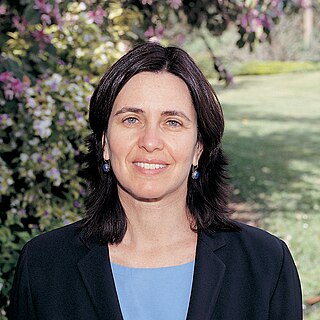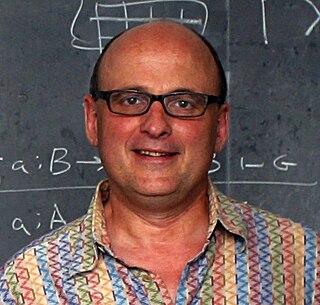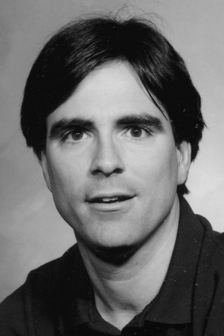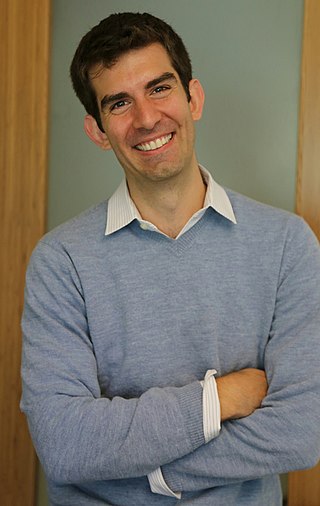
The School of Computer Science (SCS) at Carnegie Mellon University in Pittsburgh, Pennsylvania, US is a school for computer science established in 1988. It has been consistently ranked among the best computer science programs over the decades. As of 2024 U.S. News & World Report ranks the graduate program as tied for No. 1 with Massachusetts Institute of Technology, Stanford University and University of California, Berkeley.

Shafrira Goldwasser is an Israeli-American computer scientist and winner of the Turing Award in 2012. She is the RSA Professor of Electrical Engineering and Computer Science at Massachusetts Institute of Technology; a professor of mathematical sciences at the Weizmann Institute of Science, Israel; the director of the Simons Institute for the Theory of Computing at the University of California, Berkeley; and co-founder and chief scientist of Duality Technologies.

Lenore Carol Blum is an American computer scientist and mathematician who has made contributions to the theories of real number computation, cryptography, and pseudorandom number generation. She was a distinguished career professor of computer science at Carnegie Mellon University until 2019 and is currently a professor in residence at the University of California, Berkeley. She is also known for her efforts to increase diversity in mathematics and computer science.

Robert William Harper, Jr. is a computer science professor at Carnegie Mellon University who works in programming language research. Prior to his position at Carnegie Mellon, Harper was a research fellow at the University of Edinburgh.

Randal E. Bryant is an American computer scientist and academic noted for his research on formally verifying digital hardware and software. Bryant has been a faculty member at Carnegie Mellon University since 1984. He served as the Dean of the School of Computer Science (SCS) at Carnegie Mellon from 2004 to 2014. Dr. Bryant retired and became a Founders University Professor Emeritus on June 30, 2020.

The Human–Computer Interaction Institute (HCII) is a department within the School of Computer Science at Carnegie Mellon University (CMU) in Pittsburgh, Pennsylvania. It is considered one of the leading centers of human–computer interaction research, and was named one of the top ten most innovative schools in information technology by Computer World in 2008. For the past three decades, the institute has been the predominant publishing force at leading HCI venues, most notably ACM CHI, where it regularly contributes more than 10% of the papers. Research at the institute aims to understand and create technology that harmonizes with and improves human capabilities by integrating aspects of computer science, design, social science, and learning science.
Arie Nicolaas Habermann, often known as Nico Habermann, was a noted Dutch computer scientist.

Mary Shaw is an American software engineer, and the Alan J. Perlis Professor of Computer Science in the School of Computer Science at Carnegie Mellon University, known for her work in the field of software architecture.

Randolph Frederick Pausch was an American educator, a professor of computer science, human–computer interaction, and design at Carnegie Mellon University (CMU) in Pittsburgh, Pennsylvania.

Manuela Maria Veloso is the Head of J.P. Morgan AI Research & Herbert A. Simon University Professor Emeritus in the School of Computer Science at Carnegie Mellon University, where she was previously Head of the Machine Learning Department. She served as president of Association for the Advancement of Artificial Intelligence (AAAI) until 2014, and the co-founder and a Past President of the RoboCup Federation. She is a fellow of AAAI, Institute of Electrical and Electronics Engineers (IEEE), American Association for the Advancement of Science (AAAS), and Association for Computing Machinery (ACM). She is an international expert in artificial intelligence and robotics.
Anne Elizabeth Condon, is an Irish-Canadian computer scientist, professor, and former head of the Computer Science Department of the University of British Columbia. Her research focuses on computational complexity theory, DNA computing, and bioinformatics. She has also held the NSERC/General Motors Canada Chair for Women in Science and Engineering (CWSE) from 2004 to 2009, and has worked to improve the success of women in the sciences and engineering.
Mary Lou Ehnot Soffa is an American computer scientist noted for her research on compilers, program optimization, system software and system engineering.

Adam Wierman is Professor of Computer Science in the Department of Computing and Mathematical Sciences at the California Institute of Technology. He is known for his work on scheduling (computing), heavy tails, green computing, queueing theory, and algorithmic game theory.

Eric Poe Xing is an American computer scientist whose research spans machine learning, computational biology, and statistical methodology. Xing is founding President of the world’s first artificial intelligence university, Mohamed bin Zayed University of Artificial Intelligence (MBZUAI).
Jessica K. Hodgins is an American roboticist and researcher who is a professor at Carnegie Mellon's Robotics Institute and School of Computer Science. Hodgins is currently also Research Director at the Facebook AI Research lab in Pittsburgh next to Carnegie Mellon. She was elected the president of ACM SIGGRAPH in 2017. Until 2016, she was Vice President of Research at Disney Research and was the Director of the Disney Research labs in Pittsburgh and Los Angeles.

Chris Harrison is a British-born, American computer scientist and entrepreneur, working in the fields of human–computer interaction, machine learning and sensor-driven interactive systems. He is a professor at Carnegie Mellon University and director of the Future Interfaces Group within the Human–Computer Interaction Institute. He has previously conducted research at AT&T Labs, Microsoft Research, IBM Research and Disney Research. He is also the CTO and co-founder of Qeexo, a machine learning and interaction technology startup.
Jodi L. Forlizzi is a professor and Geschke Director, as well as an interaction designer and researcher, at the Human-Computer Interaction Institute at Carnegie Mellon University. On August 29, 2022, Forlizzi was named a Herbert A. Simon Professor at Carnegie Mellon. Her research ranges from understanding the limits of human attention to understanding how products and services evoke social behavior. Current research interests include interaction design, assistive, social, and aesthetic technology projects and systems, and notification systems. In 2014, Forlizzi was inducted into the CHI Academy for her notable works and contributions to the field of human-computer interaction.
Hui Zhang is a Chinese-American computer scientist and professor at Carnegie Mellon University, and an entrepreneur who co-founded Conviva.

David Notkin was an American software engineer and professor of computer science.
Maria-Florina (Nina) Balcan is a Romanian-American computer scientist whose research investigates machine learning, algorithmic game theory, theoretical computer science, including active learning, kernel methods, random-sampling mechanisms and envy-free pricing. She is an associate professor of computer science at Carnegie Mellon University.













